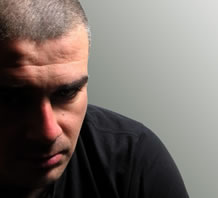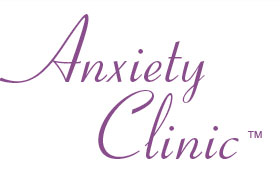Social Anxiety Disorder
Social Anxiety Disorder Symptoms - Information, Help & Advice
Social anxiety disorder is a psychological disorder where fear, anxiety and discomfort are symptomatically associated with social situations and exchanges. Social anxiety symptoms manifest both physically and psychologically and tend to become more intense (and widespread) as the social anxiety cycle continues. On this page you'll learn the symptoms of social anxiety, how social anxiety works, how the social anxiety cycle self perpetuates, why traditional treatment tends to be ineffective and most importantly - how to overcome social anxiety disorder and get your life back.
Social anxiety disorder - Common symptoms

Although each social anxiety sufferer has their own unique combination of symptoms, we've compiled a list of the most common ones we encounter. It's important to remember that simply counting up the number of symptoms isn't necessarily a true measure of the magnitude or severity of the disorder. Each social anxiety case needs to be considered on merit and this involves the types, combination and intensity of the symptoms as a whole rather than simply ticking them off and adding up the total.
However, if you're looking for information for a self-diagnosis then checking what symptoms you do and don't have is a good starting point. Here is our list of the most common physical (and behavioural) social anxiety disorder symptoms we encounter:
- Unexplained aching in the muscles
- General muscle tension
- Unexplained back or shoulder pain
- Tightness in the chest
- General tiredness and physical lethargy
- A feeling of physical detachment (like you’re not in your own body)
- Nausea
- Stiff neck
- Stomach ache / Stomach bloating
- Poor quality sleep
- Tiredness in the day / Difficulty sleeping at night
- Appetite fluctuations
If you can relate to some of these common physical symptoms, it's perhaps a good idea to also check our list of uncommon physical social anxiety symptoms and also our list of psychological social anxiety symptoms below..
Social anxiety disorder - Uncommon symptoms
The following physical symptoms, could suggest a more serious manifestation of an anxiety disorder.
- Pounding heart or palpitations
- Bouts of unusual sweating
- Loss of sex drive
- Dizziness or feeling light headed
- Numbness or pins & needles
- Dry mouth
- Night Sweats
- Bowel dysfunction - IBS / Constipation / Diarrhoea
When these symptoms are considered independently of each other they could be attributed to a host of potential problems, both medical and psychological. However, when considered alongside the common physical symptoms and perhaps even more importantly the following psychological social anxiety disorder symptoms - that's when the pieces start to fit together.
Social anxiety disorder - Psychological symptoms

Here’s the list of psychological anxiety symptoms:
- Constant bombardment of anxious thoughts
- Unsolicited and unreasonable thoughts entering the mind
- Habitual reliving of past events (replaying conversations and scenarios)
- Habitual speculation of the future and what may go wrong
- Worries or anxiety disproportionate to reality
- Disproportionate fear of failure, ridicule, loss or even death
- Constant self talk within the mind
- Unreasonable focus upon protection and safety of self and/or others
- Thoughts of personal unworthiness or incompetence
- Lack of confidence and self-esteem
If this list of symptoms resonated with you - you almost certainly have social anxiety disorder or another related anxiety disorder. Remember we said earlier that the actual number of physical symptoms you experienced wasn't necessarily a true indicator of the severity of your condition? A far more accurate indicator is how many of the psychological symptoms you can related to experiencing. This should give you a reasonable idea of how deeply you're into an anxiety disorder and is thus proportional to the specialised help you need in order to recover.
The cycle of social anxiety disorder...
Social anxiety disorder operates using a self-perpetuating cycle. If this were not the case then you'd already be over it. The elements of the social anxiety cycle are 'thoughts, emotions and (from time to time) outside events'. You may feel that outside events (social events, personal interactions, day to day socialising) are the key element in making you feel anxious - however this is not the case.
Events are merely a trigger for social anxiety... not the cause. In many ways (in terms of recovery) this is a good thing as in reality there is little you can do to influence the outside world and the people around you. So if events (people and situations) are merely a trigger - what is the underlying cause of social anxiety?
Let's use an example from your own life and experience to prove the point:
Have you ever felt anxious about an upcoming event, appointment, meeting or social task? Surely the answer must be yes, otherwise you wouldn't be here reading this text. Now, even though you felt anxious in that moment - was the event, appointment, meeting or social task actually occurring? Of course not. In reality you were merely 'thinking' about it... but this was enough to make you 'feel anxious'.
Social anxiety disorder has a nasty habit of making sufferers focus their attention on something that isn't actually the problem. This gives the disorder free reign to run without question or genuine opposition. The fact that social anxiety sufferers focus their attention on something that isn't the problem, ensures that the real problem remains unaddressed. Clever isn't it?
The first step in your recovery is gaining awareness of how social anxiety really works. This means shifting your attention away from avoiding or controlling social situations and towards focusing on the process that makes you feel anxious.
The process that creates anxiety (and all emotional states for that matter) is thought. When we say thought, what we are talking about is the brain processing information. Some thoughts you are consciously aware of (as you see mental imagery and hear a voice in your head) whereas other thoughts occur without you noticing the process.
You're probably thinking right now - "but I can't control my thoughts, they just appear in my head. I try and try to turn them off or make them go away, but they wont!" The great news is that your mind is normal and is working correctly. There's nothing wrong with your ability to think and process information. You problem stems from having the same habitual repetitive thought processes that make you feel anxious all the time. This is where we can help...
Unsolicited, repetitive thoughts - The fuel behind social anxiety...

If you are a social anxiety sufferer, we don't need to ask if you have unsolicited, repetitive thoughts that make you feel anxious. However, what we would like to ask is - "where do the unsolicited thoughts come from?"
What we're getting at is "if you don't want these unpleasant thoughts - why do they keep appearing in your head all the time?" Surely it's your mind and you should control what goes on in there, so who or what comes up with these troublesome thoughts?
Let's consider for a moment what doesn't habitually and repetitively come to mind. Generally speaking, bland, dull or otherwise unimportant stuff doesn't seem to crop up in our thoughts very often (if at all). However, on the other side of the coin things we consider to be important do seem to crop up repeatedly. The question is - how do we define what is and is not important?
The answer is that the brain has a very simple way of assessing what is and isn't important. If a thought or event doesn't stimulate any emotional response - it's unimportant. If a thought or event stimulates a strong emotional response then the brain considers it to be important. Obviously there's a sliding scale between the extremes.
Emotional responses are essentially a barometer our mind uses to assess and feedback how we relate to what goes on around us. However, the brain does not differentiate between actual events and ones we remember or speculate about through our thoughts. Both elicit emotional responses.
Now, if we accept that the brain does differentiate between important and unimportant thoughts and events - it must have a way of storing or dealing with that information accordingly. What actually happens is that thoughts and events with zero or minimal emotional responses get discarded and are filed out of the way or deleted completely. The brain considers there seems little point in retaining information it dictates to be unimportant. However, when a thought or event elicits a strong emotional response the brain not only considers it to be important but also files the information with the intention of reprocessing it in the future.
Now let's consider the unsolicited, repetitive thoughts you experience. Do they elicit strong emotional responses? Does your mind consider them to be important? Does your mind file the information with the intention of reprocessing it again and again? You see, you're not at all broken or sick. Your mind is doing its job perfectly well in terms of how it is designed to work. The problem you have is that you've become stuck in a cycle of thoughts creating emotions which in turn regenerate thoughts which in turn generate more emotions. This process has remained hidden from you whilst you focus all your attention on believing 'social situations' are the real problem.
What you need are tools and techniques to break this cycle - and this is where you need some outside help. No amount of logic, knowledge or rationalising social anxiety disorder will make the cycle go away. We specialise in helping sufferers of all anxiety disorders to break their cycle, recover and get their lives back.
Recovering from social anxiety disorder - Your options...

There are typically four options for the average social anxiety sufferer:
Option one is to do nothing and hope it goes away on its own. However, you know as well as we do that your anxiety has become worse over time and not better. This is simply the cycle anxiety disorders follow. When left alone they tend to spiral downwards, sometimes out of control. Burying your head in the sand is potentially asking for even more trouble as time progresses.
Option two is to keep searching the internet for more information. Unfortunately, you can never 'know enough' to simply overcome an anxiety disorder on your own. Your anxiety disorder did not come about through a lack of knowledge or information. It came about because of your emotional responses to certain thoughts and situations. Basically, going on a crusade for information is just distracting you whilst the anxiety disorder cycle gets an ever tightening grip on your life...
Option three is to go down the traditional treatment route. You go to see your GP, they offer you medication or if you're lucky you may be referred to a mental health organisation. If you accept medication you may feel better temporarily. However, medication isn't designed to fix the problem - only to temporarily suppress (mask) the symptoms. The underlying cause of your anxiety is still running behind the scenes and getting stronger. The time will inevitably come when they drugs no longer work or you'll need to come off them... what then? Are you ready for your anxiety to come back with a vengeance? If you take the mental health organisation option you'll find yourself on the treadmill with thousands of other sufferers. The reason there are so many sufferers is that the treatment is largely ineffective. Why else would there be such long waiting lists and huge case loads?
Option four is to be realistic and to help yourself. What we mean by this is that you need to take serious stock of your situation and act accordingly. We don't mind what you choose to do. The decision is entirely yours and all we can do is lay our cards on the table, provide you with information and make you our offer. Many of our now recovered clients had previously spent months (and even years) suffering whilst being passed around between GP's psychologists, psychiatrists, mental health groups and being prescribed drugs that didn't solve their problem.
We understand that sometimes a sufferer needs to go through the motions of finding out what doesn't work before they're willing to commit to taking control of their lives and helping themselves. However, if you've already reached the point where you've had enough of suffering and are willing to commit to take action - we are ready to help you.
What to do now...

We run an established Clinic in Staffordshire, although if you don't live in or near Staffs we can still help you. We offer both face to face Consultations at our Clinic as well as working via Online (Skype) Consultations with clients who live outside of our region.
The good news is that working Online keeps our operating costs down and we are able to pass these savings on to our clients by providing very competitive Consultation fees. We also offer a no quibble satisfaction guarantee, so if for any reason you're not completely satisfied at the end of your Initial Consultation and don't want to continue working with us - there's no charge. You only pay for that session if you choose to continue working with us..
What do you have to lose?
Choose from the following links depending on where you live:
I'm interested in Face to Face Consultations at the Anxiety Clinic in Staffordshire
I can't get to the Anxiety Clinic so Online Consultations (Nationwide) would be better for me







